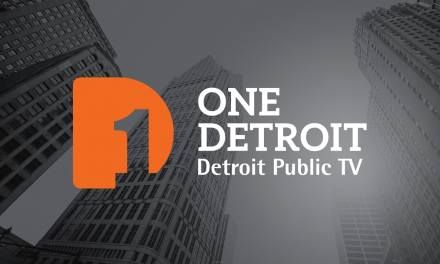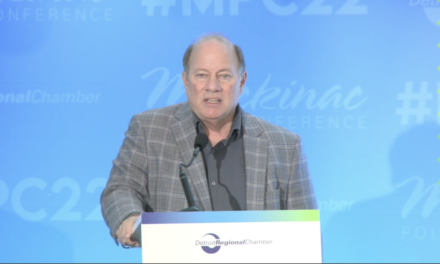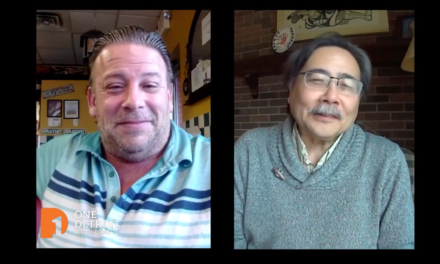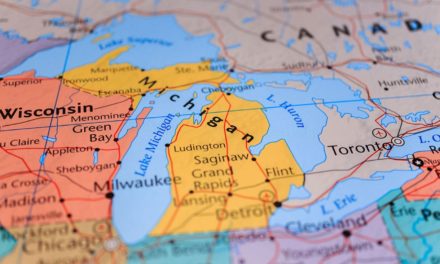Michigan has a long history of acceptance and support for refugees hoping to resettle in the state, but just what cultural, economic, and population-based impacts have these immigrants brought to their new homes? One Detroit Senior Producer Bill Kubota took a trip to the state’s capital, Lansing, to examine the status of Michigan’s immigration today and the changes we’ve seen to refugee resettlement over the past 20 years.
RELATED: EMU Students Help Afghan Refugee Families Move Into New Homes
RELATED: Jawad Sukhanyar: An Afghan Journalist’s Story On Fleeing Taliban Forces
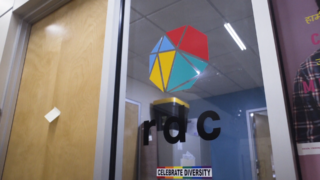
The Refugee Development Center, located in Lansing, supports the resettlement of refugees to the mid-Michigan area.
Kubota meets with Refugee Development Center Executive Director Erika Brown-Binion to talk about some of the refugees her organization helps resettle in the mid-Michigan area, like Yohana Ferra, a Cuban immigrant who now owns and operates a Cuban food truck in Lansing’s Old Town. Then, he has a conversation with Steve Tobocman, Executive Director of Global Detroit, and Demographer and Data Driven Detroit Founder Kurt Metzger detailing how Michigan’s immigrant resettlement has driven positive growth in the state’s population and economy. Plus, resettled refugees in Lansing and Warren share their perspectives on moving to Michigan and fostering new ethnic communities together.
Full Transcript:
Yohana Ferra, Owner, Habana Delights Food Truck: In Lansing, we don’t have too much Cuban food. I think that it would be a good idea to make a business for Cuban food.
Bill Kubota: You’ll find Yohana Ferra’s Habana Delights Food Truck in Lansing’s Old Town. Living her dream, three years now. Well, when did you come from Cuba?
Yohana Ferra: In 2014.
Steve Tobocman, Executive Director, Global Detroit: I think the story, particularly when you look statewide for the state of Michigan, is just how diverse this state is and how diverse the international community is.
Yohana Ferra: I’m so happy to make this kind of sandwich. I came with my husband and two sons, and they become so good, a good future for them.
Bill Kubota: But Michigan’s future? We’ve got a population problem. Here’s demographer Kurt Metzger.
Kurt Metzger, Demographer: And so what we have seen in 2020, was the first time the deaths outnumbered births. Immigration is the only way we’re going to grow our population. We have always gained population through what we call a natural increase, which is births over deaths. That’s always been a driver of population growth. In addition, we’ve had immigration. And fairly significant, not great numbers, but the state averaging somewhere around 18 to 20 thousand immigrants a year plus some movement from secondarily coming to other parts of the country and coming to Michigan. But we’ve always been what we call an outmigration, domestic out migrant state. We always send more people away than we bring in.
Bill Kubota: Steve Tobocman leads Global Detroit, an advocate for immigrants in our communities.
Steve Tobocman: Immigration in Southeast Michigan and across Michigan, just like other parts of the middle part of the country, have really been a great benefit and an untold story over the last 20 years.
Bill Kubota: Why is it untold? I would think there are a lot of people that want to talk this up. This is an attraction to try to build the economy around here.
Steve Tobocman: Well, I mean, you need only look at who has been coming to Michigan over the last 20 years. Particularly since 2010, we know that more than 50 percent of the adult arrivals who are immigrants to the state of Michigan have a four-year college degree or higher, that’s roughly twice the state average. And so, there’s a highly educated community. I mean, it also includes working-class folks as well. But yet, we went through a national debate about 5 years ago, was central to the presidential campaign, that painted a picture of immigration that is very different from the reality that communities experience.
Donald Trump, Former U.S. President: When Mexico sends its people, they’re not sending their best. They’re not sending you. They’re not sending you.
Bill Kubota: Just one presidential term ago, Donald Trump proclaimed his southern wall would save thousands of lives from an onslaught of undocumented criminals, a problem statistically unfounded.
Steve Tobocman: Unfortunately, about 5 years ago, as we were resettling a lot of new refugees from the Middle East, particularly Syria, and there were some attacks in Europe, suddenly, this issue flipped.
Bill Kubota: Terrorists attacked Paris in 2015, killing more than 100. Trump brought on the so-called “Muslim Ban” restricting immigration from certain countries. There were protests, but Steve Tobocman says the damage was done.
Steve Tobocman: Kind of anti-Muslim ban and rhetoric really sent a signal across the world, and as a result, some folks decided they would go somewhere else. They would go to Canada, they would go to Europe, they would go to Australia or other places that are actually benefiting from attracting global capital, global workers, talent, all of those kinds of things.
Bill Kubota: Back then, Michigan, a top state in the resettlement of Syrian refugees, hit a snag in Oakland County.
Kurt Metzger: We had tried years ago talking about Syrian refugees developing a community in Pontiac and Brooks Patterson came out very strongly against that.
Bill Kubota: Patterson, the late Oakland County executive, threatened legal action, citing the Paris attacks. The refugees still came, but no go on building a community in Pontiac.
Steve Tobocman: And suddenly people began to fear refugees. Now, the reality is that refugees are the most thoroughly vetted of any visitor to the United States. They go through 7 international and U.S. security background checks before they set foot on U.S. soil.
Bill Kubota: Under Trump, refugee resettlement numbers plummeted. Now, with the Afghans coming and Joe Biden in charge, a change is underway.
Steve Tobocman: And what we’ve seen, thankfully in this past year, is a much stronger embrace and a much more robust level of support for the new arrivals that we’ve gotten from Afghanistan. Then, say, 5 years ago, when we shut down the border too, you know, all Muslims and refugees at the beginning of the Trump administration.
Erika Brown-Binion, Executive Director, Refugee Development Center: We have folks from Iraq, Iran, Afghanistan, Syria, Sudan, Eritrea, Burma and Nepal.
Bill Kubota: Lansing’s Refugee Development Center helps new arrivals. Erika Brown Binion leads a staff of 23 and a lot more volunteers helping immigrants get situated.
Erika Brown-Binion: Our goal, since the very beginning, has been to support refugees after they arrive in mid-Michigan so that they can be successful and able to thrive here and really build roots and stick around and be part of our community.
Bill Kubota: RDA began 20 years ago when Afghan refugees came here after 911. Now, a few hundred more are settling in the Lansing area, some already on the job working.
Erika Brown-Binion: We also have a really vibrant cultural broker team, which includes people who were once a refugee themselves and bring cultural and linguistic expertise to our team, so that we are best able to connect with families and their needs.
Bill Kubota:] Brown Binion touts her city’s welcoming reputation, offering English classes, support groups and help for entrepreneurs like Yohana Ferra, with their food truck.
Yohana Ferra: RDC helped me a lot. The first time because I don’t know how I can do the business.
Kurt Metzger: There continues to be this idea that immigrants are going to take our jobs, immigrants are going to drive down wages, all these things. And that’s certainly not the case.
Bill Kubota: Last year economist David Card won the Nobel Prize, looking at how immigrants affect the paychecks of longtime residents. He looked at Miami in 1980 when the Mariel boatlift brought an influx of new workers fleeing from Cuba.
Steve Tobocman: And what David Card has shown, that when you isolate a labor market like the Mariel boatlift in Cuba that saw over 100,000 low skilled Cuban workers enter the Miami labor market, is that indeed other low skilled workers actually saw their wages increased.
Bill Kubota: Compare that to Steve Tobocman’s own study last year here in Detroit, looking at part of Southwest Detroit and the Bangla-town area, where because of immigration, property values rose, vacancies in blight drop, while new businesses emerge. Now, tens of thousands of Bangladeshis are here in Hamtramck, Detroit and beyond.
Waluir Rahman, President, Islamic Center of Warren: At one time, the city was economically and financially it was going down, but people from our community, they started up in their business, they start they creating a job, opening the businesses. And actually, that’s helping the city, at the same time, we are being, you know, a good citizen and we always teach our community for the being a good citizen, contribute to the community, helping the community for the better life.
Kurt Metzger: We’ve seen kind of what the auto industry and everything has meant to immigrant families for centuries now. I mean, it’s like when you think of the Middle Eastern community, and you tend to think that these are kind of recent immigrants coming and yet they can go back. Some of the Palestinian immigrants and Lebanese are going back to the 1800s.
Bill Kubota: For Bangladeshis, a common East Side story like the Poles and Italians before them, who a century ago were deemed less desirable immigrants by the Federal Dillingham Commission. Some Bangladeshis came to America after World War II, a lot more and more recently. That’s according to Syed Hoque, who studied Bangladeshi American history.
Syed Hoque, Real Estate Agent, Warren, MI: They used to live close to the Detroit downtown area. Then back nineteen 1970, they moved in the Hamtramck area.
Bill Kubota: Building a mosque, established a community.
Syed Hoque: This way, the Bangladeshi American community grew up in Hamtramck and around Hamtramck.
Bill Kubota:] Now, many have moved north in places like Macomb County, some congregating at the Islamic center of Warren. On this day, holding a COVID vaccine clinic. Michigan has the second largest population of Bangladeshis. Only New York has more, a community of factory workers, business owners, tech workers and college students.
Steve Tobocman: Immigrants contribute to a quarter of all the high-tech startups in America and over 50 percent in Silicon Valley, and they’re also business owners on Main Street. They own 28 percent of the main street style businesses, like restaurants and grocery stores and dry cleaners.
Kurt Metzger: There should be kind of a coalition of these groups trying to figure out, how do we attract and then how do we retain. We educate a lot of immigrants; how do we retain them after they graduate.
Bill Kubota: How to get more people to move here. Nadeem Shakil just moved to Warren.
Nadeem Shakil, Warren. MI Resident: I just moved last summer from Atlanta. I’ve been leaving Atlanta last 30 years. The reason I moved here is the community is a very strong.
Aziz Chowdhury, Real Estate Broker, Warren, MI: Yes, the community is coming back and social media actually bringing everyone together. So, it’s a resolving lot of issues right now. And Michigan State is growing day by day.
Nadeem Shakil: And, you know, have it nice, especially food is good here. The company is good, the food is good, you know? And that’s what I always look for.
Subscribe to One Detroit’s YouTube Channel & Don’t miss One Detroit Mondays and Thursdays at 7:30 p.m. on Detroit Public TV, WTVS-Channel 56.
Catch the daily conversations on our website, Facebook, Twitter @DPTVOneDetroit, and Instagram @One.Detroit
View Past Episodes >
Watch One Detroit every Monday and Thursday at 7:30 p.m. ET on Detroit Public TV on Detroit Public TV, WTVS-Channel 56.

